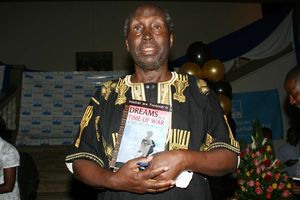
Mr Koigi Wamwere during a past interview with the Nation at his offices in Nakuru County.
Veteran politician and former political detainee Koigi wa Wamwere has paid a heartfelt tribute to Ngugi wa Thiong’o, recalling the powerful bond they forged during their incarceration.
Koigi described Ngugi’s death as a “terrible happening,” expressing deep sorrow at the loss of a friend and fellow fighter.
“It comes to us all,” said the former MP, himself an author of several books, plays and poetry. “But one still wishes it doesn’t.”
Their relationship deepened in detention, where Ngugi offered immense intellectual and emotional support. Koigi fondly remembers how the acclaimed writer helped him complete his manuscript for the book A Woman Reborn.
Also read: Ngugi wa Thiong’o: Life and Times
Ngugi’s presence in detention turned a spotlight on the otherwise forgotten political prisoners.
“He said the world would be reminded of our incarceration because they had to talk about Ngugi wa Thiong’o,” Koigi recalled. “His detention brought us back into the public eye, forcing the government to rethink our cases.”
Koigi revealed that prison life was harsh and isolating.
“There’s no merit in detention upon which you could be released. Once detained, it was as if you were forgotten,” he said. But the death of President Jomo Kenyatta brought an unexpected twist.
“We noticed the flags flying at half-mast. Guards were behaving differently. Eventually, we figured it must have been Kenyatta. We didn’t rejoice in his death—but it meant freedom was near.”
Indeed, two months after Kenyatta’s death, Koigi and his fellow detainees were released. He remembers it with mixed emotions: “It was sad that our freedom was tied to another man’s death.”
Koigi spoke of the frantic efforts he and Ngugi made to finish their manuscripts before release. “Ngugi was rushing to complete Devil on the Cross, and I wanted to finish A Woman Reborn. ”
Their secret writing activities were eventually discovered by prison authorities. Ngugi’s manuscript, written on toilet paper, was found during a search.
“The officer in charge was a decent man,” Koigi said. “He didn’t punish him. He only asked why the manuscript was on toilet paper.”
Koigi described Devil on the Cross as prophetic. “It exposed the brutality and corruption of our society long before most of us saw it. The book is about class contradiction and how the rich exploit the poor.”
He believes Ngugi’s work deserves wider readership and official recognition. “It should be in the school curriculum,” he said.
“But maybe people are ashamed of what it says about our society, or they feel too challenged by its truths.”
Koigi was detained between 1975 and 1978, and again from August 1982 to December 1984, forcing him to flee to exile in Norway in 1986.
In his prison diary, Detained: A Writer’s Prison Diary, Ngugi offers more than just a personal recollection of incarceration under the Kanu regime.
It is a powerful act of remembrance—a tribute to fellow detainees and a passionate dedication to those who have walked the perilous road of resistance in Kenya.
“For my fellow detainees at Kamiti,” he writes, “[names of detainees] may these our detentions and this suffering be not in vain!” The names, strung like a rosary, are a testament to a generation that dared to defy tyranny.
Ngugi’s memoir is more than a personal catharsis, it is a letter to the world.
“I would like to thank all those in Kenya, Africa, and the world who fought for my release and for all the political detainees in Kenya,” he writes.
Also read the first article in this series --> Ngugi wa Thiong’o: Life and Times
And the second one in the series --> Exiled Ngugi: From Ngaahika Ndeenda troubles to an international career
You may also check out this one --> World mourns as Ngugi turns into ‘a grain of wheat’
Also check this out --> 5 things you should know about Ngũgĩ wa Thiong'o






